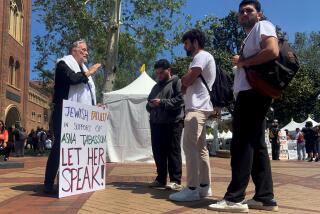Dust-up with picketing tenants puts L.A. housing authority chief in spotlight
Rudolf Montiel holds one of the biggest government jobs in Los Angeles, running a $1-billion-a-year agency responsible for sheltering more than 60,000 of the city’s neediest families.
He is also one of the city’s best-paid officials, with a compensation package of about $450,000 a year, including 10 weeks of vacation.
But despite his power and perks, in his six-year tenure Montiel has mostly flown beneath the radar — until a dust-up this month over a move to evict nine public housing tenants who picketed with others outside his Rancho Cucamonga home.
The eviction effort infuriated City Council members, who took to their microphones and rained down nasty sound bites on Montiel — calling him “Big Brother,” “childlike” and manipulative — while angry tenants upset over city policies roared their approval.
“Where is Rudy?” Councilman Bill Rosendahl demanded. “Where is he?… I would like Rudy to come before us and answer every question about this.”
Montiel, 49, did not appear, later saying he did not feel the council chamber was safe, even though it is guarded by metal detectors and armed police officers. He said he had felt threatened by some of the tenants.
But some council members wondered who was threatening whom when Montiel’s agency sent a video cameraman to a news conference called that same day by housing advocates to denounce the eviction efforts. Some, including Councilman Richard Alarcon, accused Montiel of trying to intimidate tenants.
In the two weeks since, sharply divergent pictures of Montiel have emerged at City Hall. Some praise him as a brilliant reformer who saved a struggling institution that had been plagued by scandal for decades. Others call him paranoid and vindictive, and question the terms of his lucrative employment, which also includes a $3,600-per-month housing allowance and, this year, a $25,000 bonus.
“Given that he is receiving such a nice package … you would think that [he] would be up there on a daily basis working with the people he serves,” Alarcon said. “I get the picture that this is a person who really wants to stay away from [tenants] and wants to manage them like he would manage cattle.”
The flare-up represents one of the biggest public debates in years over the person who leads the largest public housing authority west of the Mississippi. And it comes as the agency is moving aggressively to redevelop an aging housing stock, including Jordan Downs in Watts, where there are ambitious plans to rebuild the barracks-like complex into an “urban village” with shops and market-rate housing mixed in among units for the poor.
Those efforts, as well as a related move to modify how some public housing subsidies are calculated — which some fear could raise rents — have provoked concern among activists who are part of a nationwide network fighting what they call “the privatization of public housing.”
“This is a huge philosophical, political shift where the government is saying they will no longer ensure that the poorest people have housing that is publicly owned,” said Barbara Schultz, a lawyer who has sued Montiel on behalf of the nine tenants who were given notices of eviction, saying he violated their 1st Amendment rights.
Fifty tenants arrived at Montiel’s home on a Sunday afternoon. What happened next is in dispute. Tenants say they were peaceful. Lawyers for the housing authority say Montiel’s family was “held captive in their own home” when a “mob” stormed the house. About 20 San Bernardino County sheriff’s deputies responded but made no arrests.
In person, Montiel, the son of Mexican immigrants, does not come across as a divisive character. He possesses courtly manners, a quick, mordant sense of humor and a deep grasp of the complex rules of affordable housing. At public events he often stands back while politicians grab the spotlight. Outside of work, he appears devoted to his family, describing his wife as “the most wonderful woman in the world.”
In an interview, Montiel talked about his job in religious terms. “What guides my commitment to the poor is my Catholic faith,” he said. “It is about serving the less fortunate. … ‘There but for the grace of God go I.’ ”
Nevertheless, he remains something of a cipher to many in the “city family.” He doesn’t move in the same social circles and he makes his home in San Bernardino County, 40 miles away.
Montiel has defended his stewardship, noting that his agency has received high ratings from the federal Department of Housing and Urban Development.
“This place was a cesspool, and he turned it around,” said Cheryl Parisi, executive director of the American Federation of State, County and Municipal Employees District Council 36, which represents more than 400 workers at Montiel’s Housing Authority of the City of Los Angeles.
But the commotion over the evictions has prompted some council members to question his leadership. Technically, the council has no power over the authority. It is a state agency that administers federal housing money and is overseen by a commission appointed by Mayor Antonio Villaraigosa.
In the shadows of city government, the agency has lived a colorful and troubled existence. Three of the last four executive directors left after inquiries involving alleged misappropriation of public funds. The agency’s 7,000 public housing units were widely viewed as dangerous and even out of control, with gang members seizing some apartments for drug dealing and prostitution.
Montiel arrived in 2004 from El Paso’s housing authority and said he found numerous other examples of corruption, including employees allegedly cutting themselves checks and then purging the records from computers. He spent millions on private investigators and lawyers to root out problems. The effort left Montiel feeling besieged. He said he received threats against his life.
This is not the first time Montiel has faced off against a city council. During his time in El Paso, he also came under fire for what council members saw as disrespect.
“He refused to appear … numerous times,” said former Mayor Joe Wardy. “He sent a spokesperson. He sent attorneys. Then he said he didn’t feel safe, so he had security installed in his office with a buzzer because he felt threatened by some of his tenants.”
Montiel described a different kind of conflict with that council, saying his agency filed a lawsuit against the council over a development project.
Still, some Los Angeles activists say they are disturbed that Montiel has expressed fear of his tenants.
“You cannot work with people if you are afraid of them,” said Becky Dennison, co-director of the Los Angeles Community Action Network.
In the wake of the latest controversy, Montiel said he was working to find a “political solution” to let the nine tenants keep their housing. He also said he has no desire to battle the City Council.
“What I want is for us to get back to the business of transforming public housing in Los Angeles,” he said.
More to Read
Start your day right
Sign up for Essential California for news, features and recommendations from the L.A. Times and beyond in your inbox six days a week.
You may occasionally receive promotional content from the Los Angeles Times.







